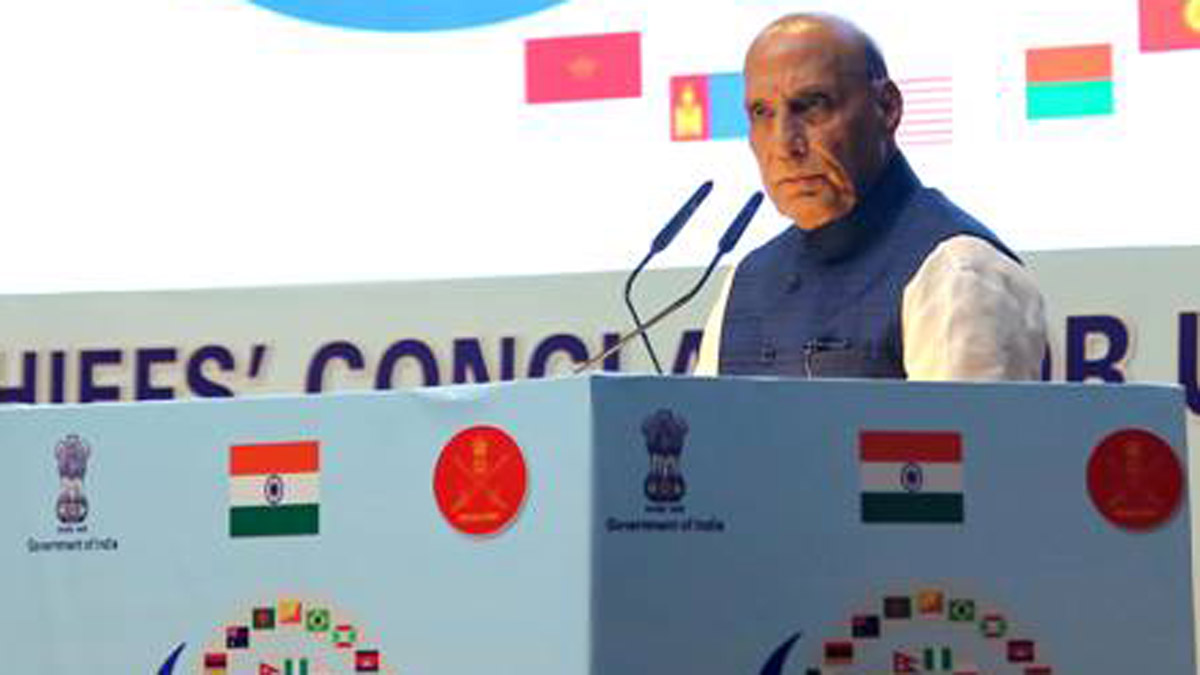Rajnath Singh calls for comprehensive UN peacekeeping reforms, highlighting role of women, technology

Defence Minister Rajnath Singh postulated a '4C formula'—Consultation, Cooperation, Coordination, and Capacity Building—as a guiding principle for the nations that contribute to the United Nations peacekeeping to tackle emerging challenges and ensure global peace.
Addressing the senior military leadership of United Nations Troop Contributing Countries (UNTCC) during the inaugural session of the Chiefs’ Conclave in New Delhi, Singh called for comprehensive reforms in the peacekeeping forces. He noted that India has always stood firm with the UN in its mission to maintain international peace and security, and added that the country remains steadfast in this commitment.
“Over the decades, nearly 2,90,000 Indian personnel have served in more than 50 UN peacekeeping missions, earning global respect for professionalism, courage, and compassion. From the Congo and Korea to South Sudan and Lebanon, our soldiers, police, and medical professionals have stood shoulder to shoulder with the international community to protect the vulnerable and rebuild societies," the minister observed.
He assured that India is ready to contribute troops, share expertise, and support reforms that make peacekeeping more effective and accountable.
"Through cooperation and technology sharing, we can build missions that are better equipped, more adaptive, and more humane,” he said.
Underscoring the importance India places on self-reliance in defence, the said the country has developed cost-effective technologies which strengthen peacekeeping missions, including land mobility platforms, secure communications, surveillance systems, unmanned aerial vehicles and medical support solutions.
Role of women
Hailing the growing participation of women as one of the most inspiring transformations in peacekeeping, the minister said their presence enhances the effectiveness of the mission, builds trust with local populations, and brings empathy into operations.
“India has been a pioneer in this domain. Our all-women Formed Police Unit deployed to Liberia in 2007 became a global symbol of empowerment. Their professionalism and compassion inspired a generation of Liberian women to join their national police. Today, Indian women officers serve in missions across South Sudan, Golan Heights and Lebanon, leading patrols, engaging with communities, and mentoring local women and youth."
According to the minister, the women represent the best of what modern peacekeeping can achieve — inclusion, respect, and trust.
Request to advanced nations
The minister highlighted the increasingly complex challenges faced by the peacekeepers, including deployment in volatile environments where asymmetric warfare, terrorism, and fragile political settlements, apart from natural calamities, and urged member states, especially those with advanced technological and financial capabilities, to enhance their support through troops, police, logistics, technology, and specialised capacities.
Singh noted that secure communications, surveillance systems, and unmanned platforms can make missions safer and more effective.
“Meeting the emerging challenges demands more than bravery, adaptability, and innovation on the part of the troop contributing countries and a comprehensive mission-level approach taking onboard relevant political actors, finance contributing countries, and other key players influencing the conflict environment to achieve the mandate. These operations often fall short due to delayed deployment, inadequate resources, and an insufficient mandate to address the root causes of conflicts. We cannot fight today’s challenges with outdated multilateral structures. Without comprehensive reforms, the UN faces a crisis of confidence," the minister observed.
Defence